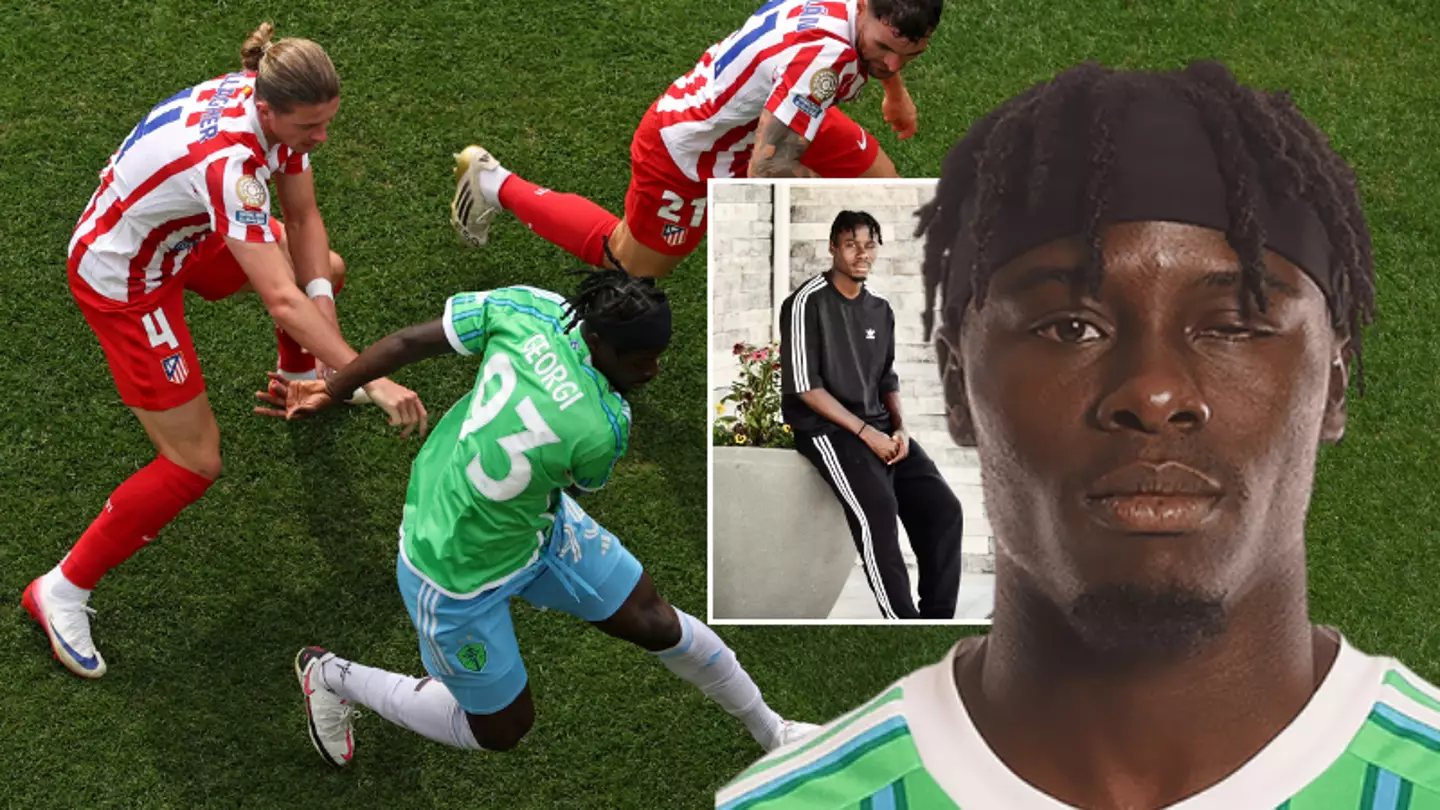
As far as stories in football go, this one is extra special – even if Georgi Minoungou is too humble to say so. "I wasn’t supposed to be here," he tells SPORTbible. "I should’ve retired at 20. But now, every game is like a final to me."
From his apartment in Seattle, the softly-spoken Ivorian speaks from the heart as he details an emotionally gruelling journey that stumped medical experts and inspired the visually impaired to overcome adversity.
On Monday night – just two years after being told by a doctor that he would never play football again – Minoungou will come up against Nuno Mendes as the Seattle Sounders face European champions Paris Saint-Germain at the Club World Cup.
"It’ll be a challenge, but I believe in myself," he says.
Advert
Minoungou is no stranger to a challenge. In fact, he encountered one of the biggest obstacles a professional footballer can face in 2023, when he lost the vision in his left eye after an unexpected series of events at a pre-season camp in Marbella.
But throughout the lowest moments remained a spirit and fight that I've never witnessed in a human being before. To hear him tell his story with such courage was nothing short of inspirational.
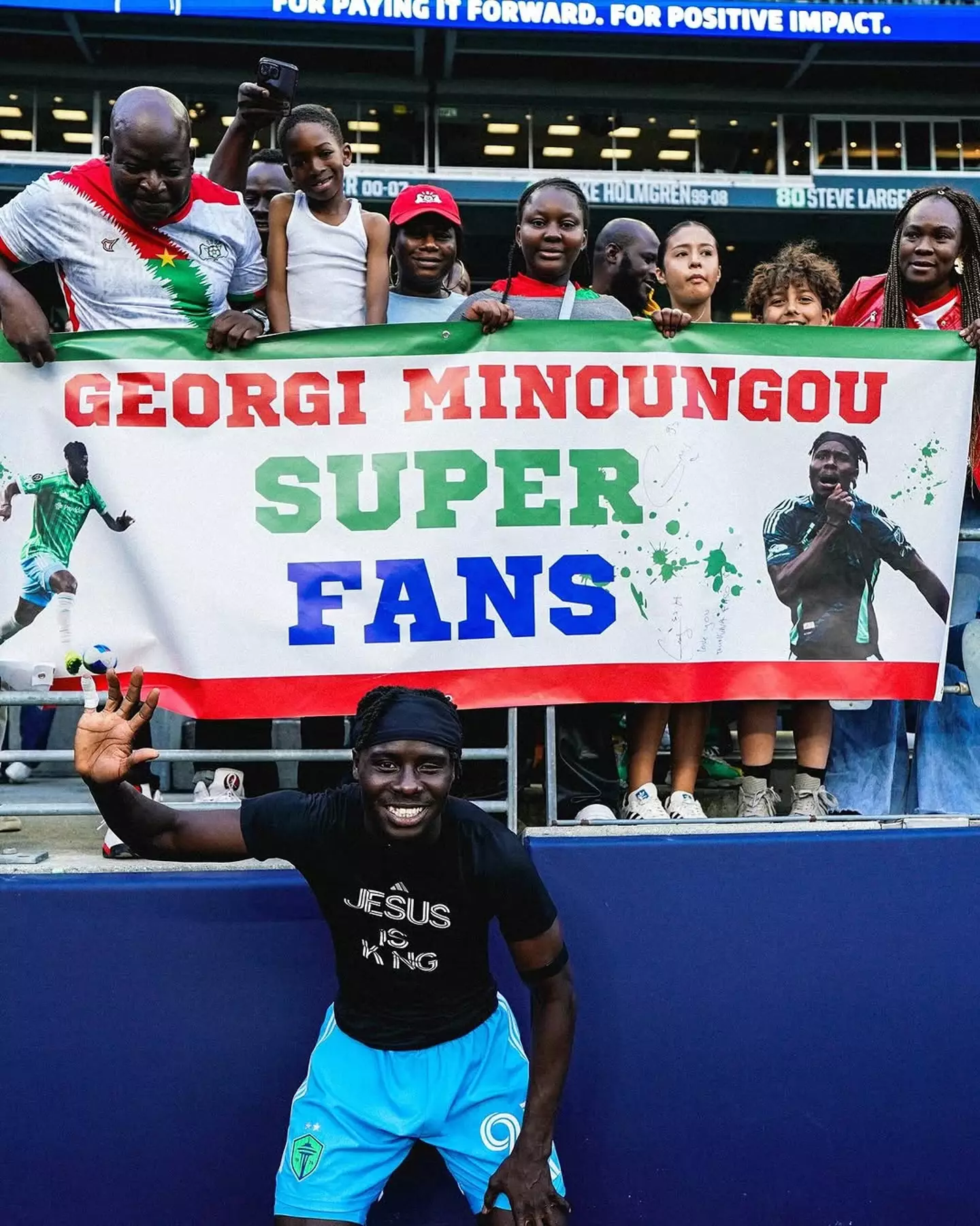
"They saw something different in me."
Back in the summer of 2022, Georgi Minoungou boarded a 20-hour flight to Washington with a poor grasp of the English language and a suitcase as he left Czech second-tier side MFK Vyskov to join Tacoma Defiance, the reserve team of Seattle Sounders, on loan.
It was a dream come true. Minoungou, who grew up in the humble surroundings of Batiebly – a small village in the Ivory Coast – was physically weak and lacked in-game intelligence, but a year later, he had done enough to earn a permanent move ahead of the 2023 campaign.
After becoming their first-ever international transfer, the hard work had paid off by winter. He was invited to play with Seattle's first-team squad at a pre-season training camp in Marbella, where he'd score in a friendly against Swedish side Hammarby IF.
"There was already a contract prepared for me to join the first team permanently," Minoungou says. "Everyone was happy – coaches, staff. Everything was in place. Then we came back from the game, and it happened."
In a devastating turn of events, the teenager was forced to sit on the sidelines, just days after being described by Seattle's assistant coach Predrag Radosavljevic as a "special" player.
"After a few training sessions, I noticed my eye was swollen and itchy," he recalls. "I didn’t think it was anything serious, but I mentioned it to the team doctor. He thought it might be an allergy. We saw a specialist, who said it could be from an animal bite. They told me, ‘Let’s just monitor it for a few days.’
"But things got worse – much worse. After three days, my eye was full of blood, front and back. A week later, the colour of it changed. It went black, then red. After two weeks, it turned completely white. We went to see a top specialist, and he was shocked. He’d never seen anything like it in 38 years."
Such was the severe damage to his eye, the doctor thought Minoungou had been hit five times simultaneously with a ball.
"I hadn’t taken a ball to the face or eye in years," he says. "They kept asking if I’d been hit. I hadn’t. Eventually, they told me they had to remove the blood from my eye. There was too much pressure building up, and they didn’t know why. They were worried it could spread to my other eye."
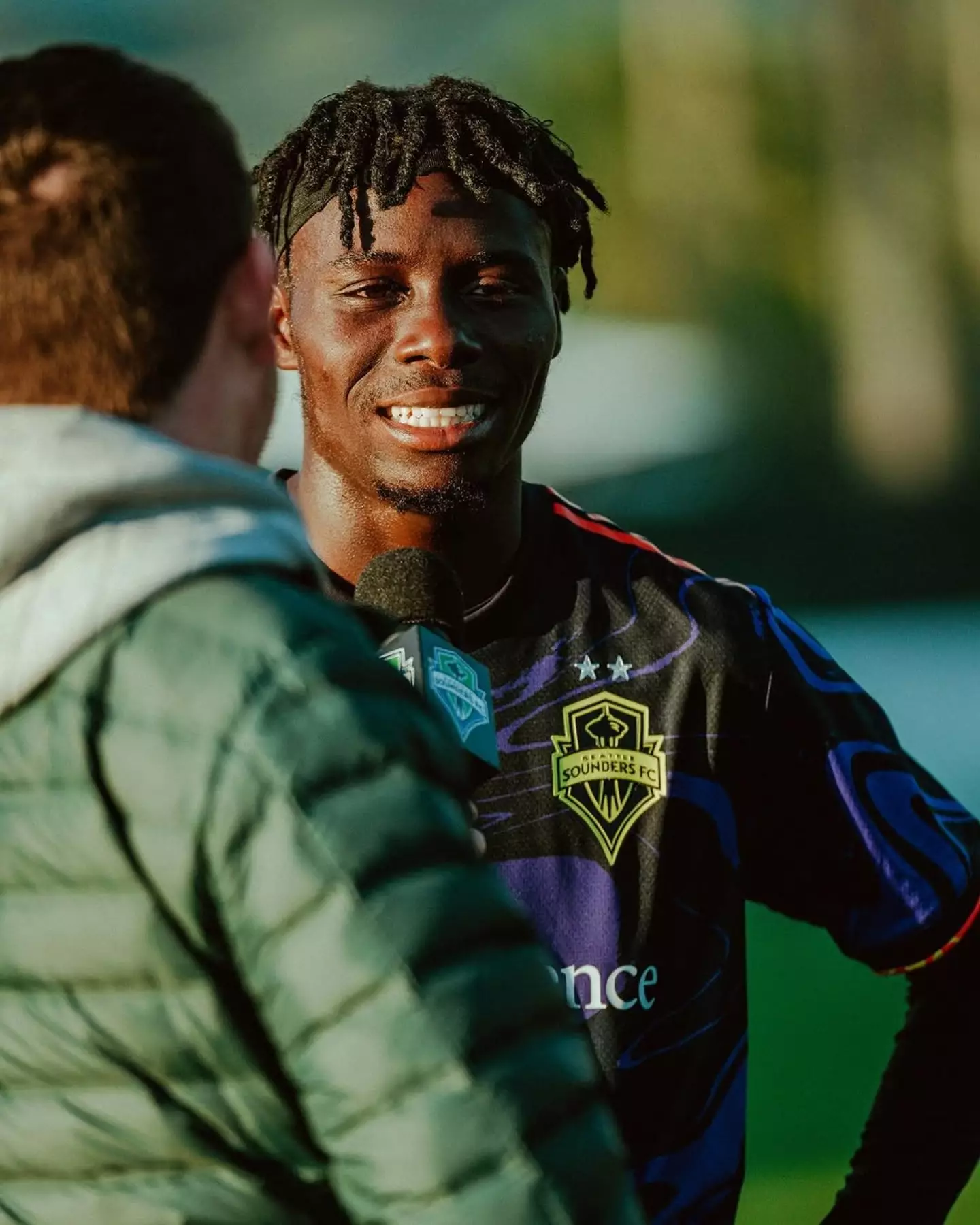
Minoungou went under the knife as doctors performed emergency surgery to try and save his vision. They removed blood from both the front and back of the left eye, but what they found was irreversible. The damage had already been done.
"What they discovered was shocking," he says. "The nerves in my left eye were completely dead. The doctor said it could be a tumour, maybe even cancer, or something I’d had since childhood. But they couldn't say for sure.
"They managed to save the eye itself, but not the vision. My left eye was completely gone. I couldn’t see anything.
"We did five or six MRIs to find an explanation, but nothing showed up. It was terrifying. I cried every night. I prayed. I’d worked so hard for that first-team contract, and now it felt like my whole life was falling apart.
"Then the doctor told me something that hit even harder: ‘Georgie, I don’t think you’ll be able to play football again'."
In his own words, it felt like Minoungou had fallen from the 100th floor of a high-rise block of apartments.
"I was broken," he says, a tear running down his cheek. "I’d played football since I was two years old. It was my whole life. I asked the doctor, ‘Are you sure?’ He said yes. They gave me daily medication to manage the risk, but my left eye was gone.
"The team doctor was preparing to file paperwork saying I couldn’t play anymore, but I wasn’t ready to give up. I asked for one week. Just one week to train. I said, ‘If I do well, I’ll keep going. If not, I’ll stop.’ The doctor told me it was risky. I told him, ‘This is my life. Not yours. Mine.’
"I come from a Christian family. My mom raised me with faith. We say: ‘We walk by faith, not by sight.’ I couldn’t let it end like that. I had to try."
Seattle's coaching staff allowed him to train, as long as he wore protective goggles. "I looked like Edgar Davids," he smiles.
On his first day back, the club's management showed their faith in Minoungou by letting him join the senior squad instead of the reserves. That meant the world.
"It was intense," he remembers. "But somehow, I balled out. That first week was perfect. I couldn’t see the whole field – just one side – but I still made things happen. I’m a 1v1 player. I dribbled past everyone. Some teammates even asked, ‘Are you sure you can only see with one eye?’
"It wasn’t easy. Every day after training, I’d study the session plans. I’d visualise everything. I trained twice a day – once with the team, then again by myself in the afternoon. I had to be better than players with two eyes. Otherwise, I wouldn't make it.
"I trained harder than ever. I slept on the field, metaphorically speaking. I had one eye, but I wanted to be the best. By December, everything changed. I couldn’t see everything, but I could feel the game. I could read it. I adapted. It’s incredible what the brain can do."
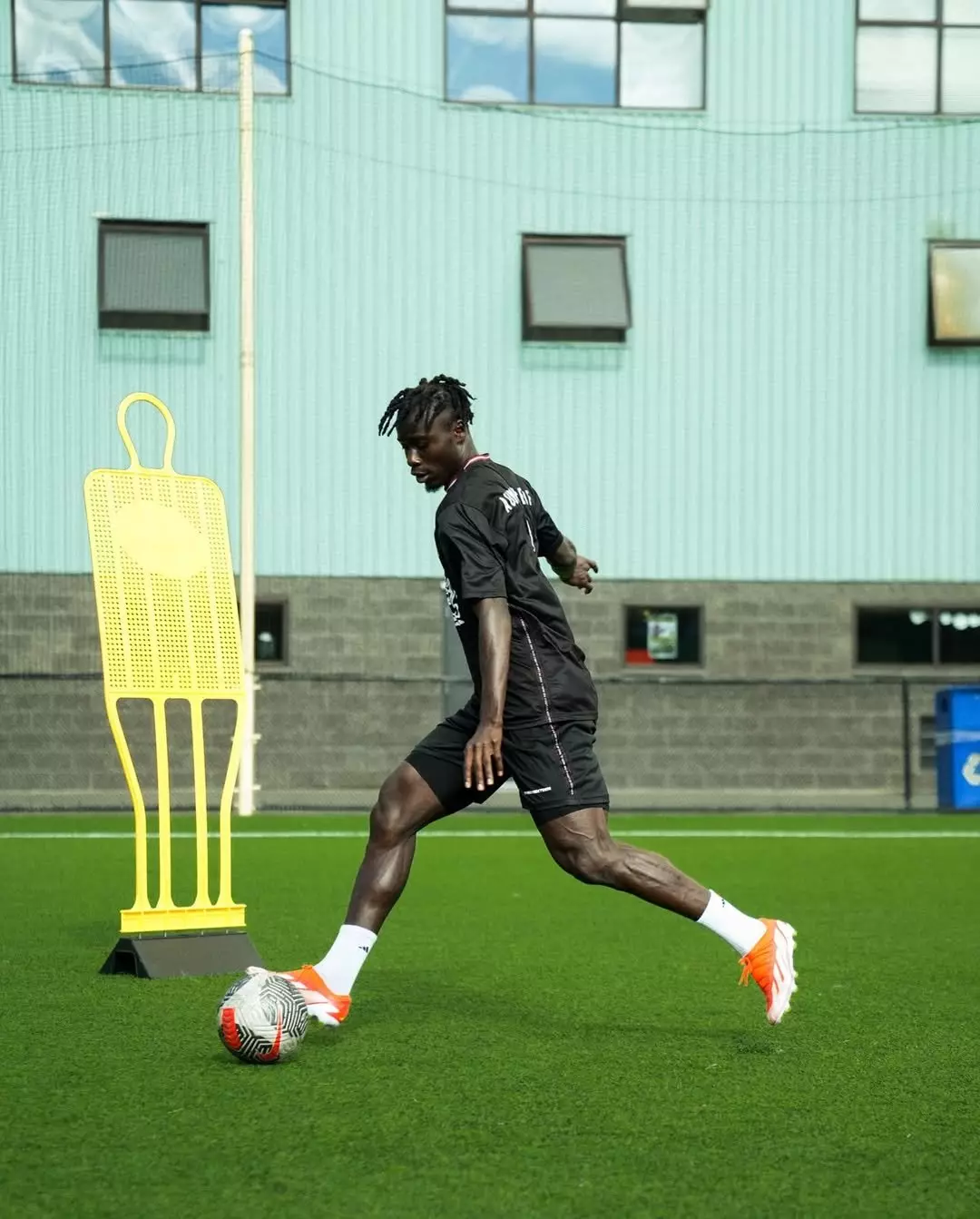
Looking back, Minoungou says there was something in him that couldn't accept what the specialist had told him that day.
Hyphema – a medical condition where blood collects in the front part of the eye, specifically in the anterior chamber – was one potential suggestion. More often that not, the condition is caused by trauma to the eye, such as a blow to the head or face.
But the diagnosis didn't matter. All he wanted to do was play football.
"A lot of people would have said, 'It’s OK, that’s life,' and move on. But I couldn’t," he says. "I come from Africa. I played in the streets. I never had any professional background. I just played ball. I travelled 24 hours to get here. I found my place.
"I was on the verge of signing a contract – and then someone tells me, 'Georgie, you can’t play?' No way. I refused to accept that.
"I told myself, ‘I’ll be better than players with two eyes.’ I wrote that down and put it on my wall. Every day, in training, in matches – I carried that fire with me.
"People often ask me why I’m so intense on the field. Off the pitch, I smile all the time. But once I step on the field, I’m angry. I play with aggression, with passion. Because I know what I have now is a gift. I wasn’t supposed to be here. I should’ve retired at 20. But now, every game is like a final to me. I give everything I have."
As he mentioned earlier on, the brain is incredibly adaptable and can compensate for vision loss in one eye, but understandably, many doubted whether Minoungou could cope on the football pitch with such a significant loss of sight.
"It’s all up here – in the mind," he says. "That was the big question from coaches: ‘If someone comes from this side, how will you see them?’ But after playing many games – and reviewing the analysis – they saw that I could see. That I was aware.
"Tactically, it’s about being in the right place at the right time. If you don’t see what’s behind or beside you, you’re done. So I trained like crazy to improve my scanning. After every training session, I worked on body positioning, scanning the field. Now I can adjust my body and see where I need to be.
"I’m a winger – I rely on explosiveness, quick dribbling, early crosses. That all requires vision. But I’ve trained my instincts. Sometimes I don’t even see a defender — I feel them. Then I just go the other way. Instinct, vision, feel – it all works together."
It took around six months to make a full recovery. His first game back was against Ventura County, the reserve team of LA Galaxy.
"I came on as a substitute and played pretty well, but it was hard," he admits. "I missed an easy chance, just because I couldn’t see properly. I felt a bit lost on the field, but I’m really grateful to have had a team that kept pushing me. They knew what I was going through, but they never gave up on me.
"Even when I wasn’t playing well, they were like, 'Georgie, we’re going to help you come back'."
After working day and night to adapt his game, things started to click into place. In fact, after impressing for Seattle's reserve side, Minoungou earned a full-time contract in August last year after making his MLS debut against the LA Galaxy three months prior.
"I kept training with the first team, and people started saying, ‘Wait, this guy really only has one eye? And he’s playing better than everyone?’
"That moment when they offered me a contract, man… it was everything I’d been waiting for. Once I signed, I started playing consistently with the first team. And last year, I helped take the team to the conference final. I had some of the best stats in 1v1s across the whole MLS. So with one eye, I achieved more than I ever imagined."
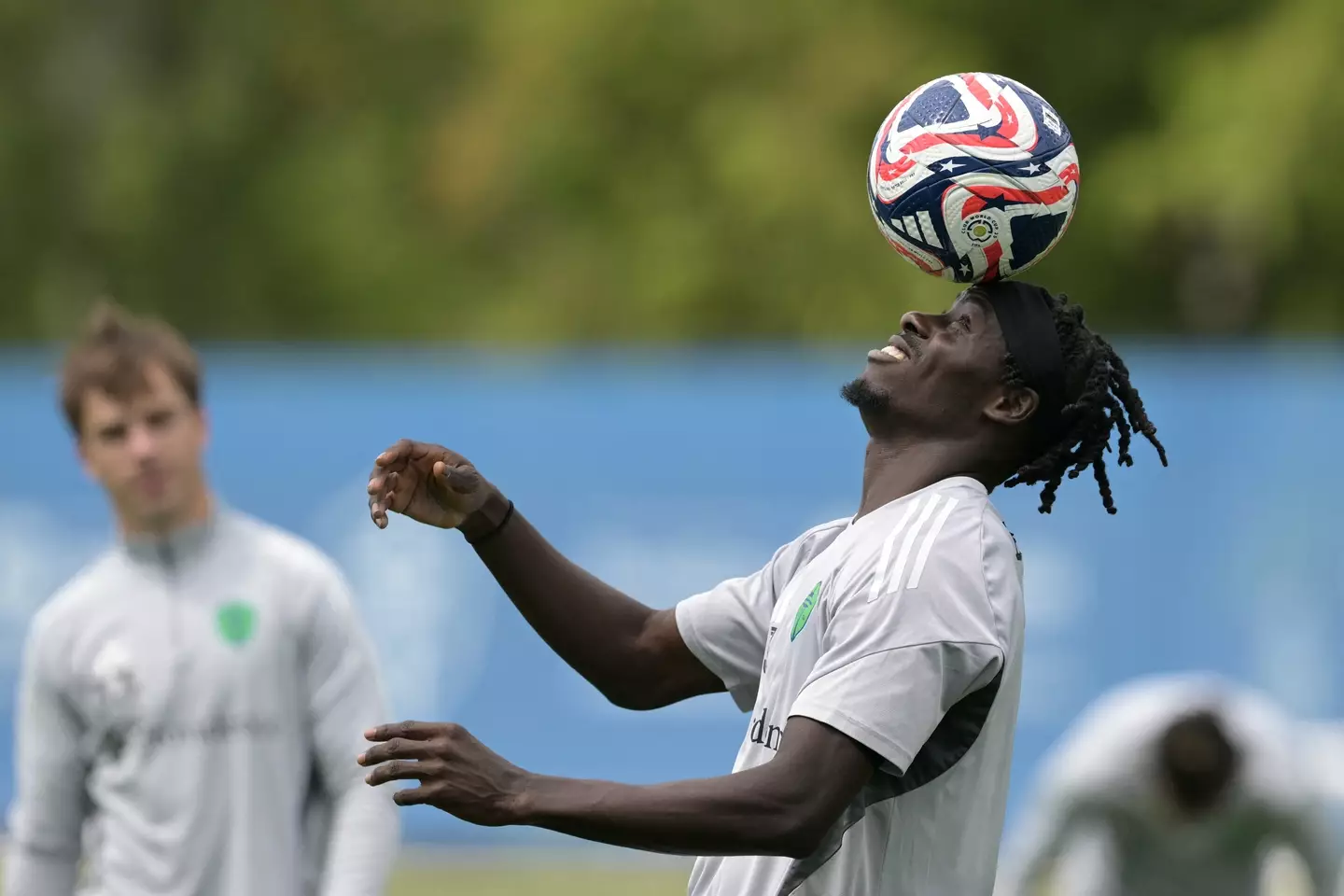
The end of 2024 was special, to say the least. In October, Minoungou scored his first MLS goal in a clash against Vancouver and by November, he started in Seattle’s Western Conference play-off final against, you guessed it, the LA Galaxy.
They lost that day, but a certain someone was in the sell-out crowd of 26,327 fans at Dignity Health Sports Park.
"I hadn’t spoken to the eye specialist for a long time," says Minoungou. "He actually thought I had stopped playing. One day, he texted our team doctor at Seattle and asked, 'How’s Georgie doing?' The doc said, 'He’s great – he signed with the first team and is about to play in a game.' The specialist was shocked. He said, 'No way. That’s impossible.’
"So I gave him tickets to the final. He came with his whole family to watch me. And that game – I was a beast. After the match, he came up to me and said, 'Georgie, you’ve changed my whole mindset. I don’t even know what to say. With what I saw in your eye, I never imagined you could do that.'
"His eyes were red. He was holding back tears. His family, his kids – they are my biggest fans now. They ask for my jersey, and I gave them one. Now, when I go back to the hospital, everyone knows me. They’re like, ‘That’s the Sounders guy!’"
Every six months or so, he will visit the hospital for a routine check-up. Shortly after the surgery, there was intense pain – especially in the mornings. From severe headaches to constant discomfort in his eye. "I couldn’t even sleep for months," he says. "But I dealt with it."
After pushing through the pain barrier, Minoungou's journey will peak on Monday night, when Seattle come up against European champions Paris Saint-Germain in the Club World Cup.
If he could go back and speak to the 2023 version of himself — just after the surgery that left him blind in one eye — what would he say, knowing that a game against PSG was waiting in the wings?
"I’d look at that version of me and say, ‘Bro, you did great not giving up. If you had, you’d have missed one of the biggest games of your life.’ I’ll probably face Nuno Mendes – and he’s one of the best left-backs in the world right now.”
Minoungou takes a deep breath and looks to the sky. "Man… it’s unbelievable," he says.
It certainly is.
As we wrap up what has been a deeply moving chat, Minoungou is thinking about an alternate universe; one where he was forced to retire after the surgery.
"Maybe I would have moved back to Africa, but I’ve always had this dream – to help others," he says. "There’s a side of football that people don’t talk about: the mental side. It’s everything. Even Mo Salah said it – football is 1% physical, 99% mental.
"I want to be someone who shows people that they can overcome the impossible. To give strength to those with disabilities – people like me who can’t see fully, or anyone going through hardship. Even now, I send part of my salary to people in need. My family and I, we support them quietly. I want to do more. I’ve been talking to a friend about starting an NGO.
"Since I shared my story, so many people have reached out. One guy messaged me to say he also had one eye and had to stop playing. There are many stories like that – people who stopped because of injury or conditions.”
"I just want people to see that no matter what you’re facing, there’s always a way forward," he says. "Quitting is never the answer."
Topics: FIFA Club World Cup, MLS, PSG, Ivory Coast, Spotlight